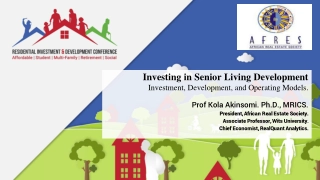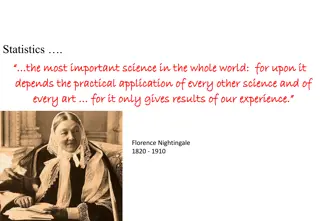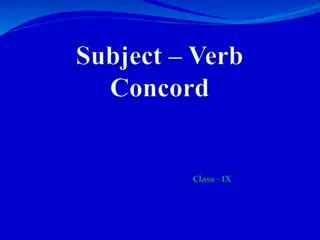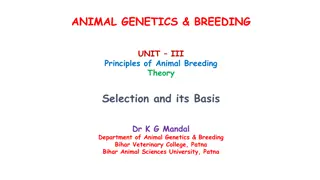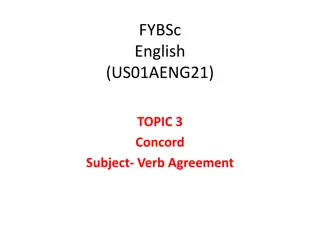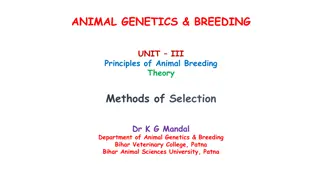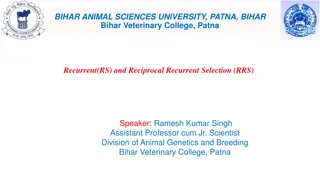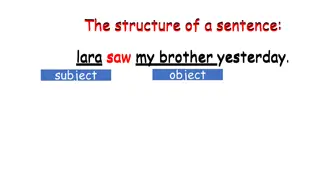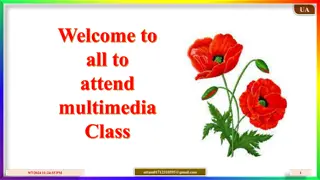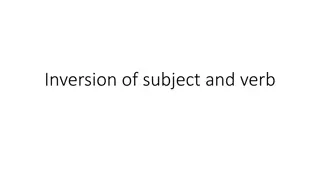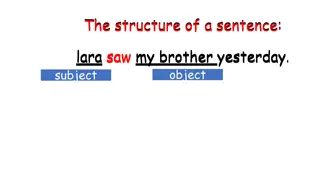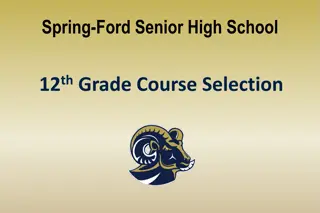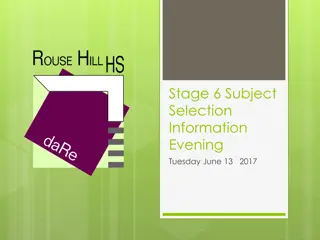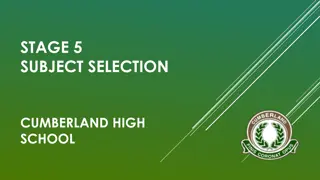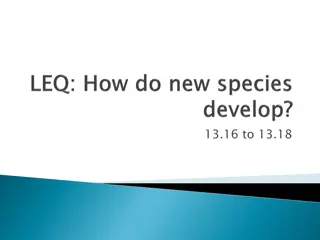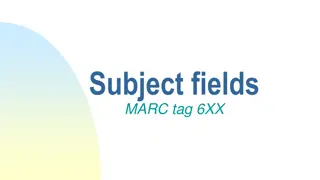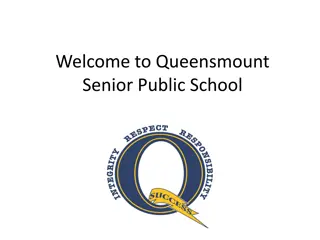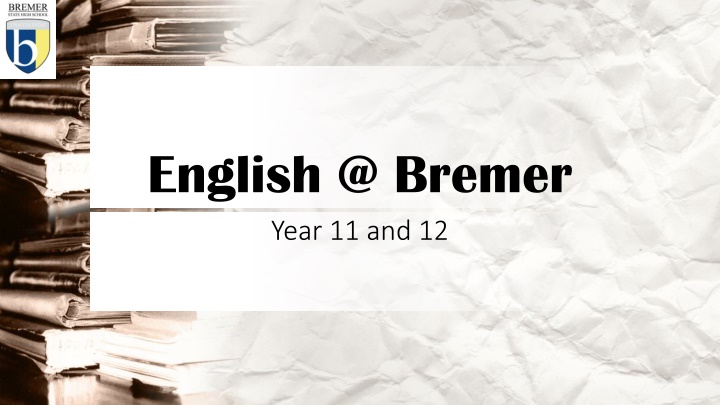
English Studies in Year 11 and 12 at Bremer High School
Explore the importance of studying English for Year 11 and 12 students at Bremer High School. Learn about the compulsory nature of the subject, the available English subjects, and how to determine the most suitable English subject based on your goals and interests. Discover the benefits of studying Literature, English, and Essential English in developing language skills and perspectives.
Download Presentation

Please find below an Image/Link to download the presentation.
The content on the website is provided AS IS for your information and personal use only. It may not be sold, licensed, or shared on other websites without obtaining consent from the author. If you encounter any issues during the download, it is possible that the publisher has removed the file from their server.
You are allowed to download the files provided on this website for personal or commercial use, subject to the condition that they are used lawfully. All files are the property of their respective owners.
The content on the website is provided AS IS for your information and personal use only. It may not be sold, licensed, or shared on other websites without obtaining consent from the author.
E N D
Presentation Transcript
English @ Bremer Year 11 and 12
Why study English? English learning area subjects offer opportunities to enjoy language and be empowered as functional, purposeful, creative and critical language users who understand how texts can convey and transform personal and cultural perspectives. In short, English develops the skills and attributes required to understand and interact with the world around us in a meaningful way.
English is Compulsory There are only two compulsory subjects in Year 11 and 12 that you will study the entire time: English and Maths. English is compulsory because: 1. You need to demonstrate you are literate by passing a unit of English for your QCE. 2. Having subjects you study the entire time allows you to meet the core component of your QCE. 3. If you are ATAR eligible, you must study and pass an English subject. 4. The skills and attributes learned in English are universal and will support you in all aspects of your life.
The English Subjects: There are three English subjects available to you in Year 11 and 12. They are: Literature (LIT) English (ENG) Essential English (ENE) There are differences, but each subject continues the development of knowledge, understanding and skills in listening, speaking, reading, viewing, designing and writing.
Determining your English Subject You would already be aware that every General subject has a Recommended Level of Achievement attached to it. Because of the importance of English to the QCE and an ATAR, your Year 10 English teachers have spoken with you about the options for English and based on what they know of you, they ve made a recommendation for which English subject would suit you best.
Literature General subject Recommended level of achievement: B For students focussed on achieving an ATAR and those that genuinely enjoy engaging with traditional text types. The subject Literature focuses on the study of literary texts, developing students as independent, innovative and creative learners and thinkers who appreciate the aesthetic use of language, analyse perspectives and evidence, and challenge ideas and interpretations through the analysis and creation of varied literary texts. Literature studies the highest number of texts, but successful students will be rewarded by having the best contribution of the English subjects towards an ATAR.
Unit 1: Introduction to literary studies Unit 2: Intertextuality Students develop knowledge and understanding of the ways literary texts connect with each other. Students develop knowledge and understanding of the ways literary styles and structures shape how texts are received and responded to by individual readers and audiences. Unit 4: Independent explorations Unit 3: Literature and identity Students demonstrate increasing independence in exploring, interpreting, analysing and appreciating the aesthetic appeal of literary texts and the insights they offer. Students develop knowledge and understanding of the relationship between language, culture and identity in literary texts.
Types of Assessment: Examination Students write an analytical essay in response to a seen question/task on a literary text. Imaginative Response (Spoken) Students focus on the reinterpretation of ideas and perspectives in a literary text. Imaginative Response (Written) Students focus on the creation and crafting of an original literary text. External Exam External assessment is developed and marked by the QCAA. Students write an analytical essay in response to an unseen question/task on a literary text.
English General subject Recommended level of achievement: B For students focussed on achieving an ATAR and those that want to engage with a variety of text types. The subject English focuses on the study of both literary texts and non-literary texts, developing students as independent, innovative and creative learners and thinkers who appreciate the aesthetic use of language, analyse perspectives and evidence, and challenge ideas and interpretations through the analysis and creation of varied texts. English provides an option for students not as comfortable studying traditional texts, but still interested in attaining an ATAR.
Unit 1: Perspectives and texts Unit 2: Texts and culture Students explore individual and/or collective experiences and perspectives of the world through engaging with a variety of texts in a range of contexts. Students explore cultural experiences of the world through engaging with a variety of texts. Unit 3: Textual connections Unit 4: Close study of literary texts Students explore connections between texts by examining representations of the same concepts and issues in different texts. Students explore the world and human experience by engaging with literary texts from diverse times and places.
Types of Assessment: Spoken Persuasive Response Students focus on the creation of a perspective through reasoned argument to persuade an audience. Written Response for a Public Audience Students respond to the representation of a concept, identity, time or place. Examination Students focus on the interpretation of a text as a springboard for an imaginative response External Exam External assessment is developed and marked by the QCAA. Students write an analytical essay in response to an unseen question/task on a literary text.
Essential English Applied subject No recommended level of achievement For students focussed on work or further training after school and for those who find English is not a strength. The subject Essential English develops and refines students understanding of language, literature and literacy to enable them to interact confidently and effectively with others in everyday, community and social contexts. The subject encourages students to recognise language and texts as relevant in their lives now and in the future and enables them to understand, accept or challenge the values and attitudes in these texts. Essential English is a universal option that supports all students at all ability levels to succeed in an English subject for their QCE.
Unit 1: Language that works Unit 2: Texts and human experiences Students explore how meaning is communicated in contemporary workplace texts and popular culture texts about the world of work. Students explore individual and collective experiences and perspectives of the world. Unit 4: Representations and popular culture texts Unit 3: Language that influences Students explore community, local and global issues and ideas presented in a range of texts that invite an audience to take up positions. Students explore how text structures, language features and language of contemporary popular culture texts shape meaning.
Types of Assessment: Spoken Response Students create and present either a persuasive, reflective or imaginative response related to a current community, local or global issue. Common Internal Assessment An examination created by the QCAA and marked by Bremer teachers. Multimodal Response Written Response Students create a written response that invites a particular audience to take up a position about an aspect of an Australian popular culture text/s.. Students create and present a multimodal response to express their perspective about a particular representation in a contemporary popular culture text/s.
English @ Bremer No matter what your English subject, your teachers and the whole of the English department at Bremer will do everything they can to make sure you succeed. Make sure you keep reading, keep writing and keep thinking and you ll see success.

